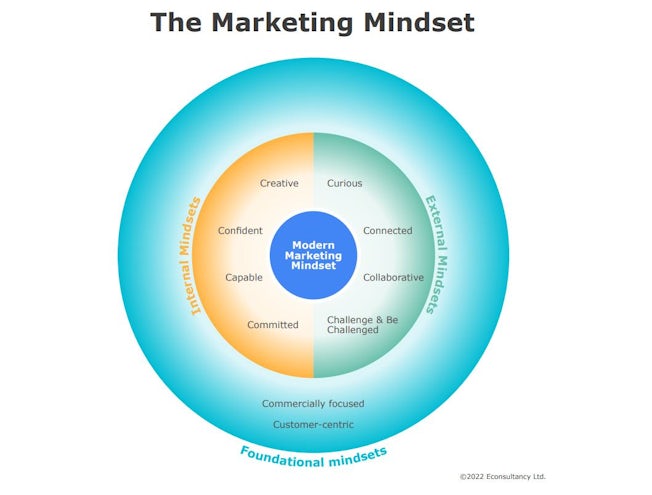In order to be successful, modern marketers need the right knowledge, skills and mindset.
In turn, Econsultancy has attempted to define marketing mindset with the 10C’s model – a framework that defines specific characteristics that contribute to success as an individual, as part of a team or within the wider organisation.
So, what exactly can cultivating a marketing mindset help organisations to achieve? The following is an abridged excerpt from the report.
So, what is a marketing mindset and how is its impact felt across an organisation? These are two of the questions addressed in Econsultancy’s report, The Marketing Mindset, which is free to download now.
Defining marketing mindset – The 10C’s Framework
Great companies know that talented people are their greatest resource. By considering mindset when recruiting and promoting, companies can set themselves up for success by developing a pipeline of future leaders.
Research by business consultant and author Jim Collins suggests that leaders will typically recognise when success was generated through teamwork, as well as take responsibility when things do not go well. Consequently, this kind of leadership helps to foster a culture of transparency and encourages two-way conversations with employees. In turn, this creates an environment where marketers do not feel afraid to speak up.
The 10C’s (figure 1) define the marketing mindset as one that is customer centric, commercially focused, capable, committed, confident, creative, curious, challenging, collaborative and connected.

The benefits of cultivating a marketing mindset
Econsultancy refers to two types of failure; ‘inherent failure’ and ‘unnecessary failure.’ Inherent failure is about managing risk, such as when launching a new campaign or product. Unnecessary failure is what happens when the marketer has failed to get the basics right, such as poor communication or bad planning.
1. Developing the leadership pipeline
Transparency is important for teamwork and collaboration. By asking questions, senior marketers demonstrate to their junior colleagues that they care about what they think and are themselves willing to listen, learn and grow.
2. Building organisational agility
Mindset shapes the way a person thinks about their role in an organisation, influencing their behaviour and the way in which they respond to a challenge. The idea of a growth mindset was developed by Dr. Carol Dwek, and the model establishes that mindset has a strong effect on the ability to improve individual capabilities.
Crisis management should be considered as a last resort when managing change. For marketers, the challenge, therefore, is to be able to recognise and react to change before the pain of a crisis.
3. Navigating (and learning from) change
Knowledge and skills are fairly easy to define but mindset, rather less so.
A study published in Psychological Science found that seven people with a growth mindset showed a greater ability to thrive through change than those with a fixed mindset, recovering faster after initial failure and used deeper learning strategies.
4. Changing the organisation’s attitude to failure
Employees should not be afraid to speak up for fear of a bad performance review or being passed over for promotion.
Research shows a strong association between increased curiosity and increased innovation. In a 2018 Harvard Business Review report published in collaboration with Merck, 1,000 business leaders in sectors such as technology, healthcare and manufacturing were asked “What makes an innovation culture?”. The leading answer for every sector? Encouraging and rewarding curiosity.
5. Facilitating a test-and-learn culture
A shift in mindset can also prime employees be more effective in learning from their mistakes and therefore adapting to change.
6. Positioning line managers as facilitators and mentors
It is mindset that underlies attitudes toward failure. Marketing leaders should understand and communicate the difference between inherent and unnecessary failure in order to create an environment where there is scope for the former.
7. Facilitating transparency and buy-in
Though it may be more difficult to pin down, Econsultancy research has shown that marketers see mindset as paramount. 74% of the 841 senior marketers we surveyed in 2020 on this topic agreed that mindset is more important to their success than experience or specific expertise.
8. Increasing innovation
An open attitude to inherent failure will also encourage marketers to challenge and update ways of working (rather than eliminating all risk). In practice, most rules and procedures are there for a reason, but marketing leaders need to beware of creating procedures that optimise mediocrity rather than creativity and innovation.
9. Enabling two-way communication
Organisations that have the capacity to institutionalise a marketing mindset will be set up to prime marketers with the capability to avoid autocratic crisis management.
In an environment characterised by a marketing mindset, individual marketers will be provided with the autonomy needed to do their jobs. When mindset is considered when hiring marketers, it becomes important to allow those people to exercise their autonomy and to support them to seek personal mastery. In such instances, marketers can look to their line manager for mentorship and direction rather than for management and monitoring.


![[Feature] New Experiment Summary](https://research-institute.org/wp-content/uploads/2022/08/feature-new-experiment-summary-768x359.png)



